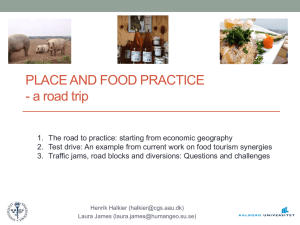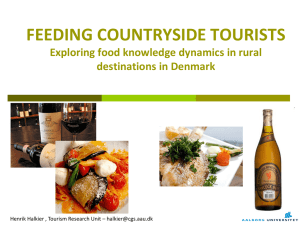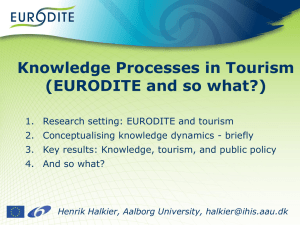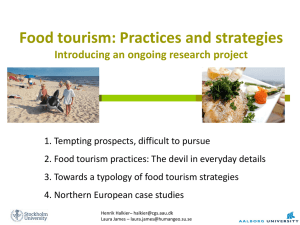Halkier SC April 2013
advertisement
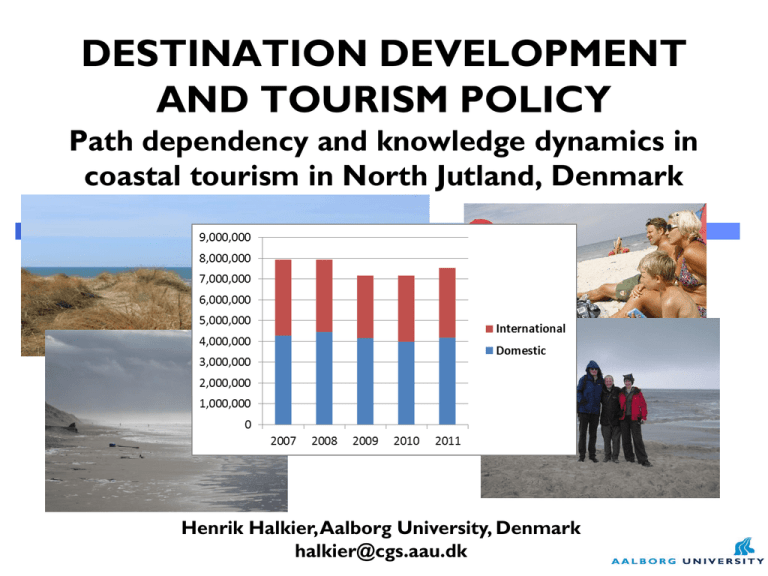
DESTINATION DEVELOPMENT AND TOURISM POLICY Path dependency and knowledge dynamics in coastal tourism in North Jutland, Denmark Henrik Halkier, Aalborg University, Denmark halkier@cgs.aau.dk DESTINATION DEVELOPMENT AND TOURISM POLICY Path dependency and knowledge dynamics in coastal tourism in North Jutland, Denmark 1. North Jutland: Coastal tourism development and knowledge processes 2. Institutionalism, destination development and public policy 3. Beyond path dependency in coastal tourism? 4. Food, tourism and cross-sectoral policies 5. Future research perspectives Henrik Halkier, Aalborg University, Denmark halkier@cgs.aau.dk BRIEF KNOWLEDGE BIOGRAPHY A case of personal path plasticity From history, politics and regional development … Teaching and research in British politics and society Research on regional policy in UK/Scotland, Denmark/EU Discourse, institutions and regional development … to tourism policy and destination development Master in Tourism Studies (destination development) Research first on actors and governance in tourism policy (local, regional, national, European) Growing interest in innovation and knowledge processes Leading to focus on systemic/institutional features (destination development and knowledge dynamics) halkier@cgs.aau.dk CONCEPTUALISATION 1 Institutionalism and destination development Institutional path plasticity Incremental change Interpretable and illenforced institutions Actors within, knowledge combination (Simone Strambach) Source: Henrik Halkier & Anette Therkelsen: Breaking out of Tourism Destination Path Dependency? Exploring the Case of Coastal Tourism in North Jutland, Denmark, German Journal of Economic Geography, May 2013 halkier@cgs.aau.dk CONCEPTUALISATION 2 Institutionalism and tourism policy 1. Policy as interactive process (live targets) 2. Policy instruments combining resources and rules 3. Assumptional orders as informal discoursive institutions 3 Political environment Implementing organisation Public actors Political sponsor Private actors Organisation Discursive terrain Policy design 1 Firms Organisations Public authorities Tourists Public actors Private actors Cultural patterns Discursive terrain 2 PROBLEM DEFINITION Policy target Economic & socio-cultural environment 3 POLICY OUTCOME Source: Inspired by inter alia Ham & Hill, Jenkins, Sabatier, Parsons,Winter – Elaborated on the basis of Henrik Halkier: Institutions, Discourse and Regional Development, Brussels: PIE Peter Lang, 2006, chapter 3. halkier@cgs.aau.dk Beyond path dependency in coastal tourism BINDING TIES Families with kids, nature-based, seasonal, neighbouring markets Automobile, self-catering, week-based Marketing Civil ownership/co-use, life-style entrepreneurs, monopolitistic rental bureaus Multi-level sectoral policy network, uneven local priority National ownership, planning restrictions halkier@cgs.aau.dk Beyond path dependency in coastal tourism MULTI-LEVEL GOVERNANCE Organisation Sponsor(s) Key tasks VisitDenmark National ministry, industry International marketing VisitNordjylland Region, local government, industry Marketing, training, development Top of Denmark, VisitAalborg, VisitJammerbugten Local government, industry Marketing, development Tourism Associations Membership of firms, individuals Stakeholder networking, marketing halkier@cgs.aau.dk Beyond path dependency in coastal tourism GRADUAL POLICY DEVELOPMENT Case study: Destination Top of Denmark Three municipalities, leading leisure tourism area Small tourism enterprises, holiday homes, camping Gradual creation of decentralised policy-network Three stages of destination development Organisation Initiatives 1989 Horizontal collaboration between tourism associations Reservation System Service Marketing 1996 Municipalities and tourism associations create DMO Prolonging of season Product development Networking within sector 2007- Municipalities and tourism associations sponsor DMO Branding All-year tourism Extra-sectoral networking halkier@cgs.aau.dk Beyond path dependency in coastal tourism UNWINDING TIES? No-kid high-spenders, +culture, short breaks +flying in Re-branding Multi-level development 1: More dull, reinforcing projects Cross-sectoral networks, professionalisation, new transport links? 1. Flexible planning 2. Innovation and coordination halkier@cgs.aau.dk 2: Uneven local change Food, tourism and cross-sectoral policies THE CHALLENGE From tempting prospects of synergy … tourists will eat anyway food experience add to attraction of destination local food an exotic quality boost local food production directly/indirectly Reduce consumption of food imported by tourists … to international food experience production chain regional food experiences must be produced regional food made accessible to visitors attractions of regional food communicated to visitors regional food experiences demanded by visitors halkier@cgs.aau.dk Food, tourism and cross-sectoral policies STRATEGIC ALTERNATIVES Communication = Organisation + = Localise suppliers Market local products + Build cross-sectoral networks Food tourism destination brand RDA DMO F T T F F halkier@cgs.aau.dk T Exchange to be increased INTER/NATIONAL CONTEXT Food, tourism and cross-sectoral policies CASE STUDIES Focus on local and/or quality food desirable well-off visitors extension of season Key actor interviews food producers food retailers local policy makers tourism / DMOs food / RDA networks (local trade council) halkier@cgs.aau.dk Food, tourism and cross-sectoral policies RESULTS Production and perceived demand: local food experiences, tourists and locals, what qualities? Private drivers: financial crisis, limited private resources, strength in numbers, a unified product Private conditions: product complementarity, limited direct competition, brand compatibility Private results: producer-driven collaboration, crossreferrals, supplier relations, bottom-up networks Public aims: bridging actors, bundling products, knowledge sharing, access Public initiatives: Network, distribution channels, branding halkier@cgs.aau.dk Food, tourism and cross-sectoral policies MARKETS AND NETWORKS MATTER Communication = Organisation + = Localise suppliers Market local products + Build cross-sectoral networks Food tourism destination brand Many strategies unfolding, synergies Links to wider strategies for extending season? Holliday homes: Self-catering and beyond? Degree of fit with development of food demand by (international) tourists? halkier@cgs.aau.dk FUTURE PERSPECTIVES Research mindmapping… Systemic perspective Actor perspective Destination knowledge dynamics Non-industrial KDs Tourism policy learning Dynami ccoastal towns halkier@cgs.aau.dk HEIs and tourism development Taste of place Food experience production chains DMO transformations Institutionalism and tourism policy PAST AND CURRENT PERSPECTIVES Research publications Halkier, H. (in print) Innovation and destination governance in Denmark: Tourism, policy networks and spatial development. European Planning Studies (October 2013). Blichfeldt, B. S. & Halkier, H (in print) Mussels, Tourism and Community Development: A Case Study of Place Branding Through Food Festivals in Rural North Jutland, Denmark. European Planning Studies (October 2013). Halkier, H. & Therkelsen, A. (in print) Breaking out of Tourism Destination Path Dependency? Exploring the Case of Coastal Tourism in North Jutland, Denmark. German journal of Economic Geopgraphy (April 2013). Halkier, H. (2012). Knowledge Dynamics and Policies for Regional Development: Towards a New Governance Paradigm. European Planning Studies, 20(11), doi: 10.1080/09654313.2012.723420. Halkier, H (2012), 'Networking and Food Knowledge Dynamics: Towards and Understanding of Factors and Strategies in Bringing Regional Food to International Tourists'. M Mair & D Wagner (red), i: Culinary Tourism - Products, Regions, Tourists, Philosophy. Springer, Wien, s. 67-80. Science and Practice Series of the FH Wien University of Applied Sciences of WKW, vol. 1 Halkier, H (2012) 'Regional Development Agencies, Regional Policy, and Knowledge Dynamics'. N Bellini, M Danson & H Halkier (eds.): Regional Development Agencies: The Next Generation?. Routledge, London, p 24-51. Therkelsen, A., & Halkier, H. (2011). Branding provincial cities.: The politics of inclusion, strategy and commitment. I Pike, A. (red.), Brands and Branding Geographies(s. 200-213). Edward Elgar Publishing, Incorporated. Halkier, Henrik. (2010) Tourism Knowledge Dynamics. In Phil Cooke et al. (eds.) Platforms of Innovation. Dynamics of New Industrial Knowledge Flows, London: Edward Elgar,pp 233-250. Therkelsen, Anette ; Halkier, Henrik ; Jensen, Ole B. (2010) Branding Aalborg. Building Community or Selling Place? I: G. Ashworth & M. Kavaratsis (eds.): Branding Places, Edward Elgar. s 136-55. Halkier, Henrik (2010), 'EU and Tourism Development: Bark or Bite?' Scandinavian Journal of Hospitality and Tourism 10 (2), 92-106. Henriksen, Pennie Fogth ; Halkier, Henrik / From Local Promotion Towards Regional Tourism Policies: Knowledge Processes and Actor Networks in North Jutland, Denmark. I: European Planning Studies. 2009 ; vol. 17, 10.10.2009. s. 1445 - 1462 Therkelsen, Anette ; Halkier, Henrik Contemplating place branding umbrellas: The case of coordinated national tourism and business promotion in Denmark. Scandinavian Journal of Tourism and Hospitality, 2008, vol. 8, nr. 2, s. 159-175. Halkier, H. (2008), 'Regional Development Policies and Structural Reform in Denmark. From Policy Segmentation towards Strategic Synergy?' in O. Bukve, H. Halkier and P. d. Souza, Towards New Nordic Regionalism. Politics, Administration and Regional Development, Aalborg, Aalborg University Press, pp. 201-25. Halkier, Henrik. / Institutions, Discourse and Regional Development : The Scottish Development Agency and the Politics of Regional Policy Bruxelles : P.I.E.-Peter Lang, 2006. 598 s. halkier@cgs.aau.dk PAST AND CURRENT PERSPECTIVES Applied research publications APPLIED RESEARCH PUBLICATIONS Maguire, Karen; Marsan, Giulia Ajmone; Nauwelaers, Claire; Halkier, Henrik; Bjerg, Jens; Dubarle, Patrick (2012) OECD Reviews of Regional Innovation : Central and Southern Denmark 2012. Paris : Organisation for Economic Cooporation and Development, OECD, 2012. 236 s. Halkier, Henrik (1996-2013): Denmark: An Overview of Recent Regional Policy Change - Country Report for EoRPA, Strathclyde University, Glawsgow, 1996Halkier, Henrik (1996-2013): Structural Funds programming in Denmark and North Jutland: Biannual Review and Thematic Report for IQ-Net, Strathclyde University, Glawsgow, 1996Halkier, H., Dahlström, M., James, L., Manniche, J. & Olsen, L. S. (red.) (2010) Knowledge Dynamics, Regional Development and Public Policy. Department of History, International and Social Studies, Aalborg University. Contributions to chapters Halkier, H. (2009) Coordination between Structural Funds Programming and National/Regional Initiatives - Objective 2 and the origins of the Danish Regional Growth Fora: ERDF project analysis for WP11 of the evaluation of the 2000-2006 ERDF programme. Vaarst : KatPlan for EPRC, Strathclyde University. Halkier, H., Henriksen, P. F., Dahl Olesen, L. & Therkelsen, A. (2009) Vidensdynamikker i nordjysk turisme: Casestudier af vidensbegivenhederinden for kyst- og kulturturisme (Knowledge Dynamics in Tourism in North Jutland: Case studies of coastal and cultural tourism). Aalborg : Center for Regional Udvikling (CRU), Aalborg Universitet. 56 s. Halkier, Henrik. (2006) Strategic Evaluation on Innovation and the knowledge based economy in relation to the Structural and Cohesion Funds, for the programming period 2007-2013 : Country Report: Denmark. Bruxelles : Technopolis. 56 s. COMPLETE PUBLICATIONS AND ACTIVITIES http://vbn.aau.dk/en/persons/henrik-halkier(8becd9c0-77db-4d2e-ab75-945244c730af).html halkier@cgs.aau.dk
